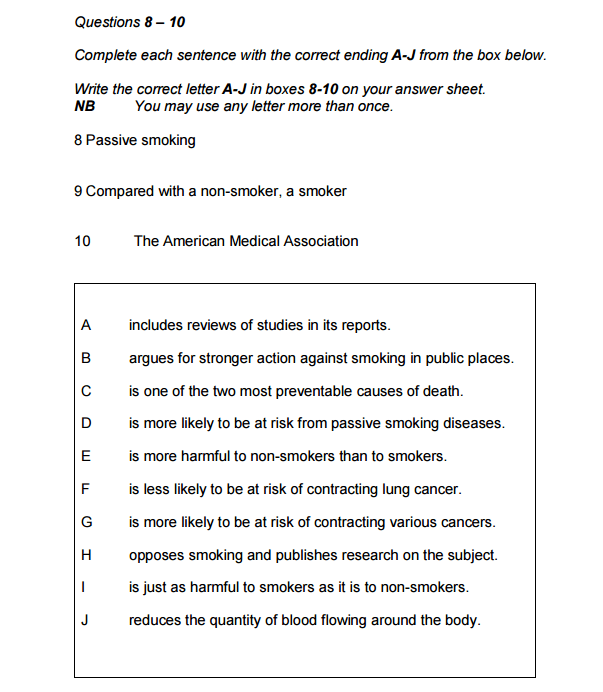In IELTS reading, might be asked to complete a ‘matching sentence endings’ question type. In this question, you will be given a list of incomplete sentences with no endings and another list with possible endings. Your job is to match the incomplete sentences with the correct ending based on the reading text.
This is not one the more common questions but should be studied all the same.
You are being tested on your understanding of how the ideas in the sentences are connected to the main ideas in the reading text.
This post will:
- look at example questions
- discuss common problems
- give you tips and advice
- provide you with a strategy to use on exam day
Example
Source: Cambridge English IELTS Past Papers.
As you can see above, there are a number of incomplete sentences and you must match them with the correct endings. There will always be more options than you actually need.
In the exam, there are normally 5-6 incomplete sentences and 8-9 optional endings.
Matching Sentence Endings: Common Problems
Lots of people think that they can answer these questions by using logic and grammar and they don’t look at the reading text. They think this will save them time and they can work out the answer quickly just by looking at the answers and matching the sentences that make the most sense. Don’t do this. It is a test of your understanding of the reading text more than a test of how sentences generally go together.
The examiner will try and trick you by connecting ideas in the reading text to endings that are not the correct answer. Remember that you are matching incomplete sentences to endings, not endings to the text.
Many people look for the exact words contained in the question in the reading text. The examiners will probably use synonyms and paraphrasing instead of exactly the same words. Don’t waste your time looking for words that exactly match with the text, instead look for synonyms and paraphrases.
For a more detailed look at paraphrasing and synonyms check out our post on sentence completions tips.
Tips for Matching Sentence Endings
- The answers are in the same order in the text as they are in the questions, so the answer to question 2 will be after the answer to question 1 and so on. Locate question one first and then you know where to begin.
- Try to predict how each sentence will end before you look at the endings.
- Start with the incomplete sentences first before you look at the endings or the text. There are more endings than required, so looking at all of these in detail is a waste of time.
- Think of synonyms and paraphrases that the examiners could be using instead of exactly the same words.
- All of the sentence endings appear in the text, but you don’t need to read all of them, just the ones that you decide to match with the incomplete sentences.
- When highlighting keywords, it is often a good idea to highlight any names, including place names, or dates. These are often easy to find in the reading text.
- Don’t just match words. Make sure the meaning in the reading text matches.
- Spend more time on the first question because this is the most difficult. You have lots of different options for the first question and it will take you more time to work out the answer. The last question should take you much less time because you have fewer options to choose from.
Strategy for Matching Sentence Endings
This is my suggested strategy. There are many different strategies and you should use the one you feel comfortable with. You can also adapt this strategy to what suits you.
- Read the question carefully.
- Read the incomplete sentences first and don’t look at the endings yet. Try to understand what they mean and highlight any keywords especially names, places or dates.
- Predict what the endings might be before looking at them. Think about what word type (verbs, nouns, adjectives, adverbs) makes the sentence grammatically correct.
- Look at the endings but not in too much detail. Try to see if there are any obvious answers.
- Eliminate endings that definitely cannot match. Think about grammar, collocations, and meaning.
- Match the endings you think might be correct. Write two or three options if necessary.
- Find the correct part of the reading text for each incomplete sentence. Be careful with synonyms and paraphrases.
- Understand the meaning of that part of the text and choose the correct answer.

